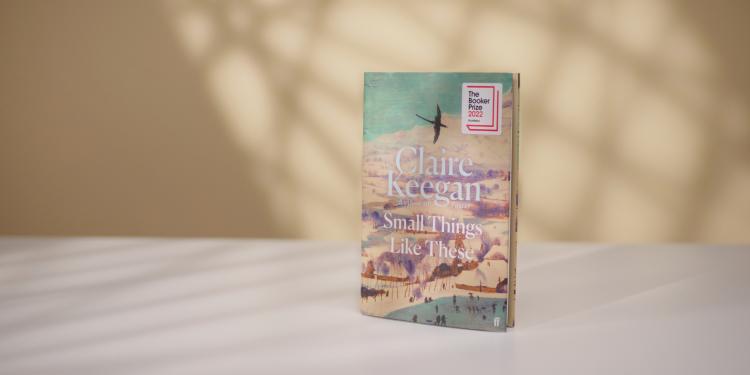
Book recommendations
Reading list

Claire Keegan’s tender tale of hope and quiet heroism is both a celebration of compassion and a stern rebuke of the sins committed in the name of religion. Read the opening chapter here
It is 1985, in an Irish town. During the weeks leading up to Christmas, Bill Furlong, a coal and timber merchant, faces his busiest season. As he does the rounds, he feels the past rising up to meet him - and encounters the complicit silences of a small community controlled by the Church.
Read more extracts from this year’s shortlisted and longlisted titles here.
In October there were yellow trees. Then the clocks went back the hour and the long November winds came in and blew, and stripped the trees bare. In the town of New Ross, chimneys threw out smoke which fell away and drifted off in hairy, drawn-out strings before dispersing along the quays, and soon the River Barrow, dark as stout, swelled up with rain.
The people, for the most part, unhappily endured the weather: shop-keepers and tradesmen, men and women in the post office and the dole queue, the mart, the coffee shop and supermarket, the bingo hall, the pubs and the chipper all commented, in their own ways, on the cold and what rain had fallen, asking what was in it – and could there be something in it – for who could believe that there, again, was another raw-cold day? Children pulled their hoods up before facing out to school, while their mothers, so used now to ducking their heads and running to the clothesline, or hardly daring to hang anything out at all, had little faith in getting so much as a shirt dry before evening. And then the nights came on and the frosts took hold again, and blades of cold slid under doors and cut the knees off those who still knelt to say the rosary.
Claire Keegan
© Frédéric StucinAnd then the nights came on and the frosts took hold again, and blades of cold slid under doors and cut the knees off those who still knelt to say the rosary.
Down in the yard, Bill Furlong, the coal and timber merchant, rubbed his hands, saying if things carried on as they were, they would soon need a new set of tyres for the lorry.
‘She’s on the road every hour of the day,’ he told his men. ‘We could soon be on the rims.’
And it was true: hardly had one customer left the yard before another arrived in, fresh on their heels, or the phone rang – with almost everyone saying they wanted delivery now or soon, that next week wouldn’t do.
Furlong sold coal, turf, anthracite, slack and logs. These were ordered by the hundredweight, the half hundredweight or the full tonne or lorry load. He also sold bales of briquettes, kindling and bottled gas. The coal was the dirtiest work and had, in winter, to be collected monthly, off the quays. Two full days it took for the men to collect, carry, sort and weigh it all out, back at the yard. Meanwhile, the Polish and Russian boatmen were a novelty going about town in their fur caps and long, buttoned coats, with hardly a word of English.
During busy times like these, Furlong made most of the deliveries himself, leaving the yardmen to bag up the next orders and cut and split the loads of felled trees the farmers brought in. Through the mornings, the saws and shovels could be heard going hard at it, but when the Angelus bell rang, at noon, the men laid down their tools, washed the black off their hands, and went round to Kehoe’s, where they were fed hot dinners with soup, and fish & chips on Fridays.
‘The empty sack cannot stand,’ Mrs Kehoe liked to say, standing behind her new buffet counter, slicing up the meat and dishing out the veg and mash with her long, metal spoons.
Gladly, the men sat down to thaw out and eat their fill before having a smoke and facing back out into the cold again.
Small Things Like These is published by Faber, £10
Well done to @CKeeganFiction for being longlisted for the #BookerPrize2022 with ‘Small Things Like These’. @FaberBooks https://t.co/eiXLAcQqmt pic.twitter.com/ASg3BbPLlY
— The Booker Prizes (@TheBookerPrizes) July 26, 2022
